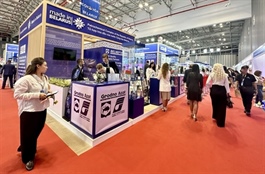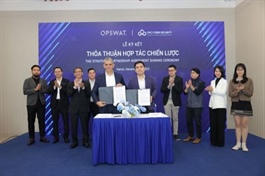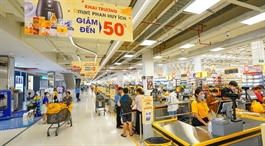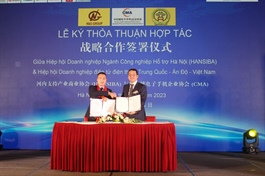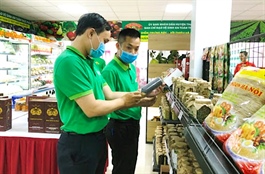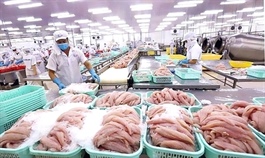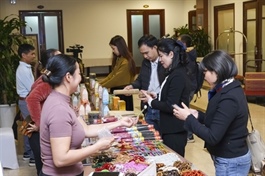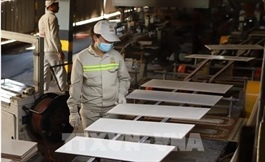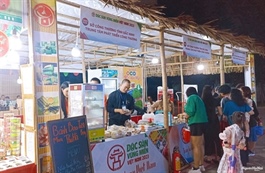Việt Nam's enterprises should take full advantages from FTAs to promote exports to Japan
Việt Nam's enterprises should take full advantages from FTAs to promote exports to Japan
Việt Nam's businesses need to more effectively exploit bilateral and multilatral free trade agreements to promote trade between the two countries, according to experts at a workshop held in Hà Nội on Thursday.
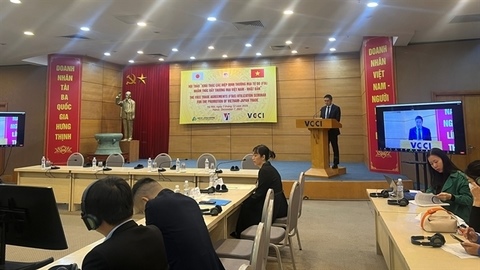
A workshop on exploiting these agreements held by VCCI and Vietrade in Hà Nội on Thursday. —VNS Photo Hoàng Hà |
Speaking at the opening of the workshop organised by the Việt Nam Chamber of Commerce and Industry (VCCI) and Trade Promotion Agency (Vietrade), Nguyễn Thị Thái Li, deputy head of VCCI International Relations Department, said: “Việt Nam and Japan now are members of four bilateral and multilateral FTAs, including Việt Nam-Japan Economic Partnership Agreement (VJEPA), Regional Comprehensive Economic Partnership Agreement (RCEP), ASEAN-Japan Comprehensive Economic Partnership Agreement (AJCEP) and Comprehensive and Progressive Agreement for Trans-Pacific Partnership Agreement (CPTPP). Those agreements are favourable conditions for businesses of the two countries to promote bilateral trade turnover."
Việt Nam and Japan's trade relations have sustainably developed over the past years. Japan is considered a potential export market for Việt Nam in many fields.
Meanwhile, as of September 2023, Japan's investment capital in Việt Nam reached US$71.3 billion with 5,143 projects, becoming the third-largest foreign investor in Việt Nam.
Japanese investors have had projects in 57 out of 63 provinces and cities of Việt Nam. Notably, large-scale projects of leading Japanese multinational corporations in Việt Nam have attracted many satellite investors operating effectively, Li said.
At the event, Hoàng Minh Chiến, Vietrade deputy director under the Ministry of Industry and Trade, also emphasised that Việt Nam and Japan have many opportunities to promote trade activities between the two countries.
Japan is a country with a developed economy, the world's leading advanced technology, and it is one of the leading countries in applying science and technology and developing the digital economy and society.
Meanwhile, Việt Nam has a highly open economy, maintains a rapid growth rate, and has large young human resources. The two countries' economies are highly complementary and have great potential for cooperation in technological innovation, digital transformation, and supply chain diversity.
The structure of export and import products of the two countries is also complementary without direct competition. Việt Nam's main export products to Japan include seafood, crude oil, textiles, electric wires and cables, timber and wood products, computers and components, coal, and footwear. Meanwhile, Việt Nam imports from Japan products and materials for industrial production, such as machinery, equipment, tools and spare parts, electronic products and components, iron and steel, raw materials of plastics, chemicals, and materials for textile, garment and footwear production.
"Many of the products that Japan needs to import are also Việt Nam's key export products, so Việt Nam has the potential to become the main supplier for Japan," said Chiến.
The bilateral and multilateral FTAs that Japan has signed with Việt Nam, according to Chiến, have created important cooperation frameworks to promote trade and investment relations between the two countries.
Yasushi Ishida, assistant director and head of the Trade and Investment Cluster, ASEAN-Japan Centre, said the key advantage of these agreements is to reduce tax rates according to the schedule. If these agreements are well exploited, Vietnamese businesses will have the opportunity to reduce the cost of goods when exporting to Japan.
Each agreement stipulates different tariff reduction levels and not all businesses know that information to be able to exploit them well. Therefore, at this workshop, the businesses will have access to useful information about the agreements to enhance export opportunities to Japan.
As Việt Nam is exporting many goods items to Japan, each item will have different conditions and requirements according to each agreement. Therefore, the businesses need to pay attention to this issue.
Yoshioka Takeomi, a researcher from the Institute for International Trade and Investment (ITI), said that Japan's trade with Việt Nam has steadily increased, making it a major trading partner of ASEAN after Thailand.
Việt Nam's use of FTAs in Japan's imports ranks second only to China, and it ranks first in terms of the amount of tariff savings under FTAs.
RCEP is being used for textile imports with relaxed rules of origin. The use of FTAs needs to be considered in terms of both tariff rates and rules of origin, he said.
However, in the future, RCEP will decrease import tariffs for goods of member countries, so Việt Nam's goods must compete with China's products, according to Nguyễn Thị Thu Trang, director of the WTO and Integration Centre under VCCI.
Before RCEP, Việt Nam had two FTAs with Japan, while China had not had any FTA with Japan. But after having RCEP with the participation of China, Việt Nam's products will have to compete with Chinese products in the Japan market, she added.
In addition, Trang said Việt Nam's enterprises can take advantage of the FTAs to promote trade in services and investment.







